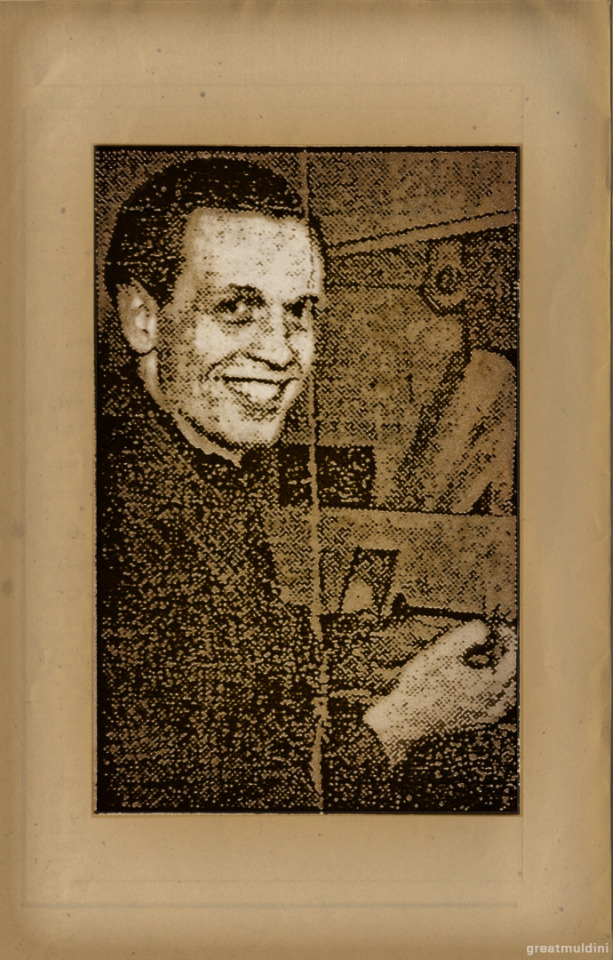#is a native of Basutoland a British Crown Colony until 1966 We are expected to suspend our disbelief in any theatrical situation
Photo



When the Sheffield Repertory Company, on 18 October 1948, invited local journalists to meet the new talent for the new season, it was not the shy smile of a timid stranger that for the Telegraph photographer epitomized the joyous occasion but the incandescent, albeit no less self-conscious, charisma of the naturally gifted performer - who may have begun his formal training on that very day in 1948 but who, by his own admission, had been acting “since birth.”
Indeed, the formal introduction of the new Assistant Stage Manager came a good seven months after the young prodigyhad been granted permission to study with the Company: his first appearance to that effect in the Minutes of the Executive Committee on 9 March 1948 was followed over the summer of 1948 by small to medium sized roles for which he received full credit but no regular pay. The precarious arrangement was revised when a "striking performance" in The Hasty Heart convinced the Executive Chairman that a “very difficult part” had been “played remarkably well.”
Originally performed on Broadway in January 1945, The Hasty Heart takes place at a British military hospital somewhere in South-East Asia, where six wounded Allied soldiers are recuperating from their war wounds. Each one of them represents his particular corner of the Empire or, in the case of “Yank,” a former colony. Looking after them is the equally archetypal female character, Sister Margaret, whose no-nonsense style of nursing soothes fraying tempers, and her compassionate approach helps to heal not just physical wounds. One patient, however, presents an existential problem: proud and stubborn Scotsman Lachlen McLachlen is terminally ill but has not been told he has very little time left. Margaret falls in love with Lachlen and agrees to marry him despite the looming death sentence. When Lachlen finds out he is furious but can in the end be convinced to accept the inevitable as he learns to accept the heartfelt friendship of his comrades and the unconditional love of his fiancée.
Lachlen’s change of heart is the result of an intervention by the “difficult” character, whose presence is required for the sole purpose of effecting that change. As the catalyst who brings about the final reversal of Lachlan's fortune, Blossom provides the evidence of their shared humanity - ironically by being different from everybody else. When Lachlen, hurt and angry at the perceived betrayal of his friends, and the indignity of his situation, declares his intention to leave the hospital and die alone, it is Blossom who steps forward to offer a parting gift. Blossom - who does not speak a single word of English and therefore would not have been aware of what the others knew - communicates non-verbally the pure, raw, primitive emotion that he alone can express. His affection is pure, untainted by superior knowledge or ulterior motives and allows Lachlen to recalibrate his own highly irrational response.
Blossom is a "difficult" character for the actor, who must convey meaning mostly through mime - and who must perpetuate the racial stereotype of the “silent black warrior” as dictated by the script, the tastes of the time, and stage conventions beyond his control: in New York, the part was played by African-American actor Robert Earl Jones (1910-2006, father of James); the 1946 West End cast featured Nigerian expatriate and star of stage and screen, Orlando Martins (1899-1985), who also took the role in the 1949 film version. The Sheffield Repertory Company, as a permanent ensemble, remained throughout the post-war period a close-knit group of local players whose white working class background would have matched the equally homogenous crowd in the auditorium.
While “exotic” characters and locations were a welcome diversion from the daily grind of the steel mills, true-to-life authenticity would not have been the foremost concern on anyone’s mind. Likewise, any lofty notions of "inhabiting the character" would have been dismissed out of hand in the fast-paced environment of the repertory system with its weekly or, as in Sheffield, bi-weekly change-over. Unlike the commercial long-running ventures on Broadway or Shaftesbury Avenue, regional repertory companies relied above all on the "quick study" and improvisation skills of the actor, favouring versatility over diversity. The need for speed also meant that certain shortcuts were considered legitimate, including the use of Blackface to indicate a character's non-white ethnicity.
The challenge for the actor underneath the generic makeup would have been to preserve the dignity of the individual in his care. The experienced producer, for his part, who elected to trust the most junior member of the Company with that responsibility, would have made his choice fully expecting his protégé to succeed. More than an adequate performance, Geoffrey Ost would have seen the “disciplines of the theatre” brought to life on stage - for the final time by the amateur. With their next production, the Sheffield Playhouse set the scene for a professional debut that could have launched a respectable career for the new Assistant Stage Manager had the fierce young “teaboy” been so inclined.
#Patrick McGoohan#The Hasty Heart#Blossom#is a native of Basutoland a British Crown Colony until 1966 We are expected to suspend our disbelief in any theatrical situation#but a super-human effort would have beenr required to mistake a lanky Irish lad fora bulky Bantu from Southern Africa#Verisimilitude could not have been the strategy#this is where the character's lack of English comes into play#the actor must entirely resort to the use of body language#which suits some actors more than others#the most egregious transgression#of our modern sensibilities however#the one that stretches our disbelief beyond belief#is the liberal application of#blackface#still acceptable for Orson Welles in 1951#controversial for Laurence Olivier in 1965#unsustainable for Black Minstrels on the BBC in 1978#I would like to believe that Blossom could have been#ahead of his time in 1948
15 notes
·
View notes